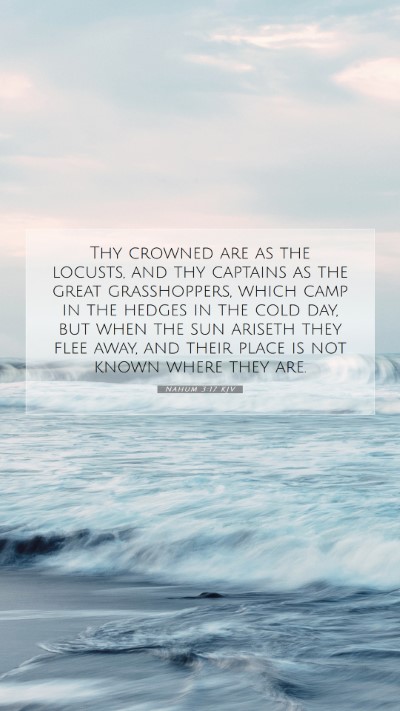Old Testament
Genesis Exodus Leviticus Numbers Deuteronomy Joshua Judges Ruth 1 Samuel 2 Samuel 1 Kings 2 Kings 1 Chronicles 2 Chronicles Ezra Nehemiah Esther Job Psalms Proverbs Ecclesiastes Song of Solomon Isaiah Jeremiah Lamentations Ezekiel Daniel Hosea Joel Amos Obadiah Jonah Micah Nahum Habakkuk Zephaniah Haggai Zechariah MalachiNahum 3:17 Meaning
What is the meaning of Nahum 3:17?
Thy crowned are as the locusts, and thy captains as the great grasshoppers, which camp in the hedges in the cold day, but when the sun ariseth they flee away, and their place is not known where they are.
Nahum 3:17 Bible Verse Meaning
Understanding Nahum 3:17
Nahum 3:17 states: "Your commanders are like grasshoppers, your officials like swarming locusts that settle in the walls on a cold day—when the sun appears, they fly away, and no one knows where."
This verse, embedded within Nahum's prophecy against Nineveh, contains profound lessons about leadership, transience, and divine judgment. Below is a summary of its implications based on various public domain commentaries.
Bible Verse Meaning and Commentary
This verse reflects the vulnerability and instability of Nineveh's rulers. Assyrian leaders are compared to:
- Grasshoppers: Symbolizing their insignificance and vulnerability, which contrasts starkly with their former might.
- Locusts: Illustrating their fleeting presence and lack of substance, as locusts appear under specific conditions and quickly disappear.
Key Insights from Commentaries
Commentators such as Matthew Henry, Adam Clarke, and Albert Barnes offer various interpretations of this passage:
- Matthew Henry: Emphasizes the ease with which God can remove those leaders who oppose Him. He draws parallels to how easily a scourge can be dispersed, noting that leaders lacking divine backing are destined to fail.
- Albert Barnes: Indicates that the comparison with locusts also suggests destruction. Just as locusts devour crops, the Assyrian leaders had caused societal decay but would themselves be decimated by God's prevailing justice.
- Adam Clarke: Adds a historical context, highlighting Nineveh’s past glory contrasted with its impending doom. Clarke notes how this imagery stresses the notion that human power is ultimately temporary.
Significance of Nahum 3:17 in Biblical Context
This verse is pivotal as it conveys the overall message of divine retribution against oppression and tyranny.
- Transience of Earthly Power: The imagery suggests that earthly authority is fleeting, likening it to pests that appear momentarily and can vanish without warning.
- Divine Sovereignty: Emphasizes God’s control over nations and leaders; this serves as a reassurance for the oppressed that justice will ultimately prevail.
In-Depth Bible Verse Analysis
The descriptive language used portrays a sense of urgency and imminent calamity. It encourages readers to reflect on:
- How societies can rise and fall under the weight of moral decay.
- The necessity for just leadership that acknowledges a higher moral authority.
Applying Nahum 3:17 to Daily Life
Understanding this verse also prompts practical reflection:
- Self-Examination: It can lead individuals to evaluate their own leadership roles—whether in family, community, or work—and assess if those are based on justice and righteousness.
- Encouragement in Adversity: For those facing oppression, it reassures them that God sees injustice and will act accordingly.
Related Bible Cross References
- Isaiah 40:6-8: Highlights the temporary nature of human glory
- Psalms 103:15-16: Affirms the futility of life compared to God’s eternal nature
- Jeremiah 17:5-6: Addresses the curse on those who trust in man versus the blessings for those who rely on God
Conclusion
This analysis of Nahum 3:17 sheds light on the broader themes of power, vulnerability, and divine justice. By actively engaging with these insights, individuals can foster a deeper understanding of scripture, enrich their Bible study insights, and apply God's word meaningfully to their lives.


